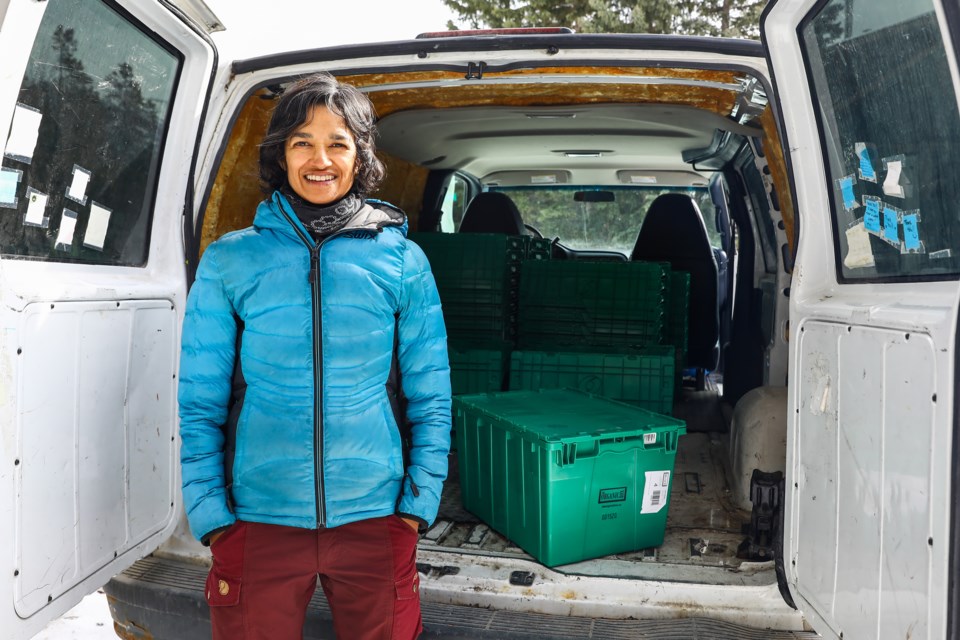BOW VALLEY – A national council created to help advise the federal Ministry of Agriculture and Agri-Food will have a local voice.
Avni Soma, president of the Bow Valley Food Alliance, was one of 23 people selected across Canada to help discuss existing and emerging issues on food in the country.
Soma, a longtime resident of Canmore who was raised in Calgary, said she’s excited to begin the role with the Canadian Food Policy Advisory Council after being chosen. The COVID-19 pandemic has only highlighted the importance of helping people with food security issues, she said.
“Food is food and we all eat every single day. Not only does the country have different needs, but each community has their own," she said.
“I am looking to learn on what’s happening in other parts of Canada and hearing their different world views.”
Soma is a small business owner, scientist and community leader with a background in health care. She has more than a decade of experience in the food industry.
She ran an organic fair trade tea company and co-initiated and developed Farm Box, which has since merged with The Organic Box. She had a role in starting the Alpine Edible Schoolyards not-for-profit group that combines urban farming and education school gardens.
The federal government announced in 2015 it would create a council to discuss food issues in Canada. In 2017, they began consultations and established a framework for the council.
A call was put out in 2019 for applicants, with Lauren Kepkiewicz – a director of the BVFA – recommending either Soma or BVFA treasurer Jill Harrison apply.
Soma said she collected letters of support from multiple groups in the region such as the Town of Canmore, BVFA, Alpine Edibles Schoolyards, Canmore Organics Recycling and The Organic Box, among others.
The council is aimed to be a collaboration of different organizations to continue to make progress on systemic food issues in Canada.
It will report to Marie-Claude Bibeau, the federal government’s Minister of Agriculture and Agri-Food, and offer advice on ongoing and possible emerging issues. It will also be a forum to share information about what is and isn’t working, while also offering suggestions on gaps in policy.
The council is a component of the Food Policy for Canada program that was announced in 2019.
“It’s important that the voices and priorities of Canadians continue to drive the initiatives in the direction of the policy,” Bibeau said in a release. “The Canadian Food Policy Advisory Council will play a key role – providing advice on food-related issues that matter to Canadians.
“The council will support the Food Policy’s vision – in the public interest – that all people in Canada are able to access a sufficient amount of safe, nutritious and culturally diverse food.”
The 23-member council will meet for the first time on Thursday (March 4).
Soma said it’s her hope the council will help lead to one new policy per year “with some definite teeth to it” that can impact areas of the country.
She gave the example of a school food program that increases students’ food literacy to help them understand where food comes from rather than just appearing at the grocery store.
“It would be great for kids to be educated on the fact that when they enter a grocery store they’re actually being marketed to," she said. "When there’s so much choice, it’s easy to get overwhelmed and you can grab the quickest and easiest thing.”
The food industry and related industries are among the largest employers in Canada.
A Statistics Canada report listed 271,935 farm operators from the 2016 census, while in 2019 is lists the national net farm income being $5.5 billion. The 2016 census also had 64.2 million hectares (158.7 million acres) of land being used in farming.
Other job sectors such as food manufacturing, restaurants and transporting food make it a pivotal function in the Canadian economy.
For Soma, she said it’s important for people to not just rely on established systems or thoughts on food. Rather than relying on massive grocery stores to fill your fridge, it’s important to become more involved.
“It’s about getting the message out about questioning our systems. Always question why," she said.
“We can all make collective change. It doesn’t have to be a certain way.”
Short-term action areas of the council:
- Help Canadian communities access healthy food
- Make Canadian food the top choice at home and abroad
- Support food security in northern and Indigenous communities
- Reduce food waste
Long-term outcomes of the council:
- Help create vibrant communities
- Increased connections within food systems
- Improved food-related health outcomes
- Strong Indigenous food systems
- Sustainable food practices
- Inclusive economic growth




